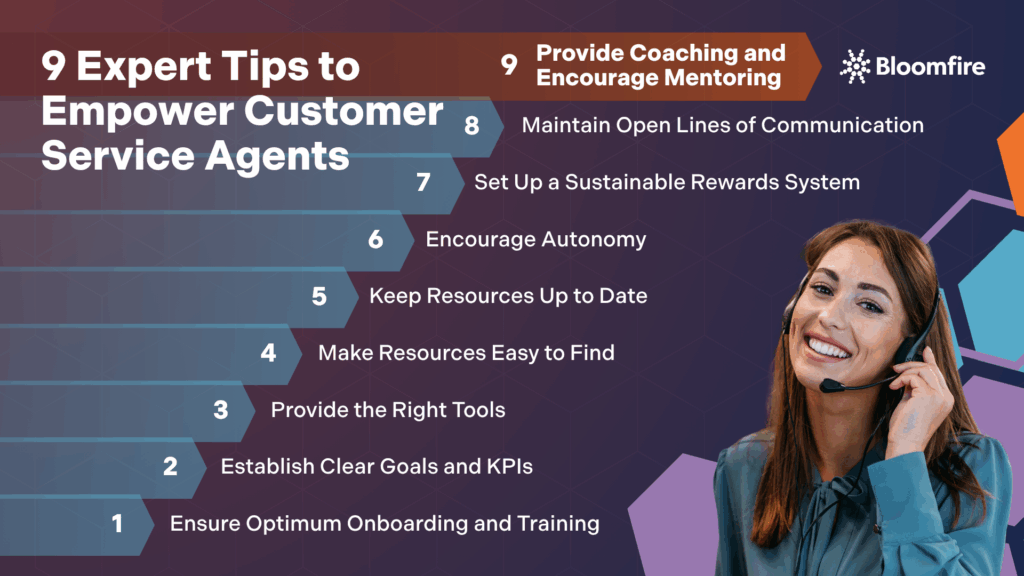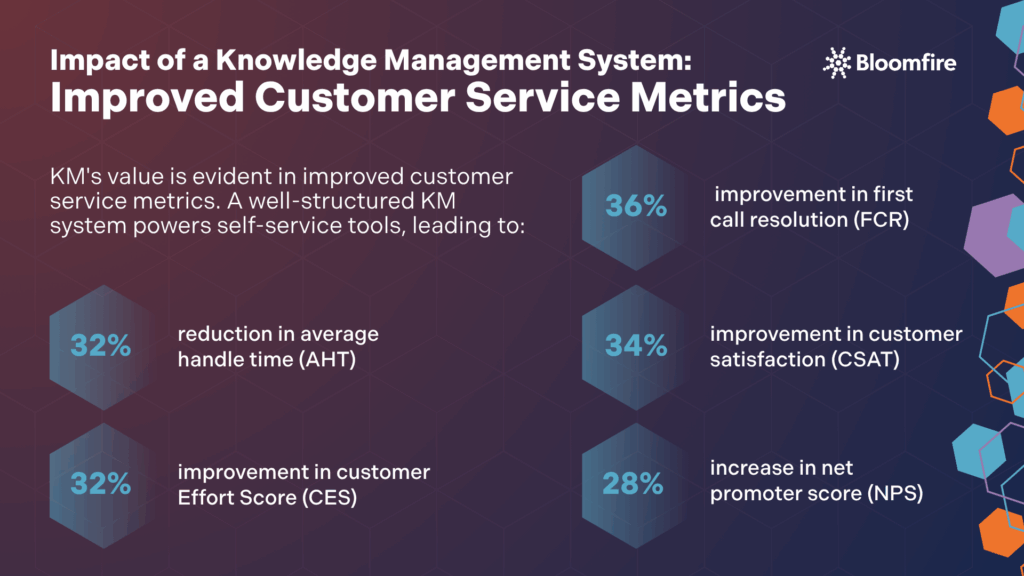How to Empower Customer Service Agents to Deliver Better Experiences

You’ve undoubtedly heard the adage, “Give a man a fish, and he will eat for a day, but teach a man how to fish, and you will feed him for a lifetime.”
You can apply the same wisdom to customer service. When customer service (CS) agents feel like they don’t have the knowledge or authority to solve problems independently, they frequently consult a manager or team leader to ensure they provide the correct resolution. That leads to frustration all around—including for customers who have to wait for their issues to be addressed.
However, equipping your reps with the right tools, knowledge, and policies can empower customer service agents to address more customer issues independently. This benefits everyone in the organization and greatly improves customer experience. To reinforce empowerment in customer service, consider the following tips.

1. Ensure Optimum Onboarding and Training
Employee empowerment begins on an agent’s first day. Make sure that your onboarding process includes necessary orientation and training, not just regarding company policies and procedures, but also job protocols and tool usage. Allocate time to discuss best practices for addressing customer issues.
To make the onboarding process effective, consider the pace of the training. A jam-packed week-long training can be overwhelming and lead to knowledge loss. Design a training schedule that appeals to different learning styles. For example, incorporate self-paced modules and accessible training materials so employees learn at a pace that works for them.
Power move: Keep your onboarding and training documents in a knowledge management system designed for customer support. This platform allows them to access all resources that improve their resolution time and quality.
2. Establish Clear Goals and KPIs
Setting transparent expectations with your customer service reps allows them to understand their purpose and direction better. When your agents are oriented on their responsibilities, they develop a sense of ownership at work and a bigger picture of how their role impacts the overarching company goals. Plus, in removing ambiguity in their functions, you set them up for success with regard to their performance and professional development.
Along with clear goals, it’s also essential to spell out your CS agents’ key performance indicators (KPIs), wAlong with clear goals, it’s also essential to spell out your CS agents’ key performance indicators (KPIs) to secure empowerment in customer service, which may include:
- Customer satisfaction call (CSAT)
- Average handle time (AVT
- Net promoter score (NPS)
- First call resolution (FCS) rate
Hitting their KPIs (or, better yet, exceeding them) can empower customer service agents and motivate your entire CS team, empowering them to strive for excellence. Provide a roadmap on attaining their targets and schedule regular feedback, recognition, and assessment opportunities.
3. Provide the Right Tools
Your CS team can perform their job not just through sufficient training but with the use of the most appropriate tools that drive efficiency and productivity. Thus, it is critical to carefully identify and invest in technology that can help produce empowered customer service agents in all aspects of their roles.
For example, internal chat systems are essential for employees to communicate with coworkers in real-time. On the other hand, your CS teams can use customer relationship management (CRM) software to house valuable notes about customers’ previous interactions with customer support, including any past issues and resolutions.
A dedicated knowledge management platform gives customer service agents quick access to the resources they need—whether that’s a canned response, a call script, or a troubleshooting guide—so they’re not starting from scratch with every interaction. And the impact is measurable: according to findings from the Value of Enterprise Intelligence report, 65% of employees spend over an hour each week recreating or duplicating work, but teams using centralized KM systems reduce that time by up to 32%, freeing agents to focus on real-time problem-solving.

Power Move: Consider implementing self-service tools for customers, such as a customer-facing knowledge base. These tools enable customers to find answers on their own—especially to common, straightforward questions—which can deflect calls from your customer service team, allowing your agents to focus on the issues that truly require their expertise.
4. Make Resources Easy to Find
When agents are on the phone with customers, they need to be able to think on their feet and act quickly. However, digging through emails, intranet folders, or old files can slow them down and cause unnecessary frustration.
With a centralized, searchable knowledge management platform, your agents can access the information they need—right when they need it. In fact, teams using KM systems save an average of 3.9 hours per week by reducing search time—a 45.9% efficiency gain that allows agents to focus more on solving customer problems and less on hunting for answers.
Housing all company policies, procedures, best practices, FAQs (frequently asked questions), customer service playbooks, and more in one central location makes searching for resources faster and more efficient. It’s an effective way to empower customer service agents as they can access and use any information immediately, allowing them to foster a positive customer experience via customer service.
5. Keep Resources Up to Date
It’s important that resources are located quickly, but it’s equally critical that they are kept up to date. Customer service agents can’t effectively and confidently resolve customer requests if they’re not sure whether they’re referencing the current version of a policy, process document, or other relevant information.
Our report also found that 80% of employees believe that frictionless access to knowledge enhances their ability to make high-quality decisions, with 35% reporting significant improvements within just six months. That’s a strong case for investing in a knowledge base that delivers trusted answers when your agents need them most.
While updating knowledge can be time-consuming, it’s helpful to select a knowledge management platform with tools to help you automatically archive outdated or irrelevant content. With a KM platform containing only trusted, up-to-date content, your employees will be better equipped to find accurate information and use it to resolve customer issues.
6. Encourage Autonomy
Autonomy is a critical component of motivation and a key driver of performance. In other words, autonomous employees will do better work. That, in turn, creates a better customer experience among brands and benefits the company as a whole. Plus, when customer service agents are more self-sufficient, leaders have the flexibility to focus on core business-building responsibilities.
Independent customer service agents are often more engaged and responsible, allowing them to reach faster resolutions, improve problem-solving skills, and deliver a top-notch customer service experience. However, cultivating a culture of autonomy must be organization-wide.
Empowering your customer service team to be self-sufficient starts at the top of your company. Leaders must demonstrate that they trust employees with a reasonable amount of power and autonomy to resolve issues independently. Your reps must perceive psychological safety to develop their ideas or take the initiative to solve a problem without fear or hesitation.
Power Move: Avoid micromanagement at all costs. Instead, encourage your customer service agents to take ownership of their role, share knowledge — such as procedures or practices that work best for them — and trust their judgment within established boundaries.
7. Set Up a Sustainable Rewards System
Recognizing and rewarding your CS team for outstanding performance, achievements, or specific behaviors empowers customer service agents, as these acts show that the company values their dedication and hard work. To ensure this positive reinforcement system is stitched into the team’s culture, recognition and incentives must become a consistent framework and be documented in your KM platform.
Employee reward programs should go beyond occasional bonuses and must be designed to boost morale that drives your reps to deliver better customer experiences and pursue continuous learning. You can even deploy gamification to drive healthy competition.
Offer reward variety aside from monetary options (e.g., performance-based bonuses, gift cards, salary increases). Some examples of these non-monetary rewards include public acknowledgment, feature stories in newsletters, conference attendance, or extra vacation days.
Develop clear criteria on who qualifies for specific rewards. Recognition doesn’t need to follow a strict schedule—timely appreciation, even for small wins, can go a long way in boosting morale.
8. Maintain Open Lines of Communication
A key factor in empowering customer service teams is fostering a culture of openness and support, which can be achieved by establishing open communication. Managers should provide multiple channels of communication where reps can get information quickly when resolving issues.
Aside from internal chat systems, teams should leverage their customer service knowledge base. This can reduce escalations and promote confidence in decision-making.
Additionally, managers and leaders should create an avenue for agents to express their concerns, share ideas, identify pain points, and offer valuable insights relevant to their roles. Supervisors should also provide positive and constructive feedback to help them elevate their customer service skills and performance.
9. Provide Coaching and Encourage Mentoring
Solid mentorship among your customer service agents positively influences employee empowerment and retention, which is why 98% of US Fortune 500 companies have robust mentorship programs.
Customer agents are responsible for resolving recurring customer service concerns independently, utilizing their designated tools and resources. However, in the interest of improving career development initiatives and tackling complex issues, ongoing coaching and mentoring from more experienced representatives allow your agents to improve their skills.
Veteran employees can help new agents understand their roles more effectively. They can show the ropes on how to navigate complicated customer challenges and think of possible solutions through knowledge transference, whether via in-person or virtual coaching.
Power Move: Bolster your customer service team’s coaching and mentoring initiatives by encouraging senior employees to transfer their knowledge and expertise to your KM platform. Ask them to document answers to common questions, best practices, and any tips they have for addressing unique situations.
Real-World Examples of Empowerment in Customer Service
When you have a clear plan to fortify your CS team through empowerment initiatives, the benefits become apparent through increased customer satisfaction, engagement, and overall experience. The following companies were a testament to these positive consequences. Check out their core strategies for inspiration.
1. Giltner Logistics: Fostering greater alignment
Giltner Logistics, a prominent third-party logistics (3PL) provider managing freight brokerage, intermodal, and trucking services across North America, faced the significant challenge of integrating a rapidly growing, remote workforce. To empower their distributed teams and accelerate employee effectiveness, Giltner implemented a robust knowledge management solution through Bloomfire.
The centralized platform transformed how employees accessed critical information. New hires can rapidly find answers to common questions and understand company processes, drastically reducing onboarding time. For existing employees, the system eliminates time wasted searching for information, providing immediate access to updated policies, operational guidelines, and best practices.
2. MGM Resorts International: Expanding employee professional development
MGM Resorts International, a global leader in hospitality and entertainment, demonstrates its commitment to employee empowerment through its extensive talent development programs. Its tuition-free College Opportunity Program, a comprehensive internal Academy with thousands of digital courses, and the self-directed LEAD program for leadership skill-building are notable examples of these initiatives.
MGM Resorts International also leverages Bloomfire, a centralized knowledge management platform, providing on-demand access to continuously updated, consistent information. This action reduces search times, enabling employees to prioritize guest interactions and deliver efficient service, which in turn boosts their confidence, job satisfaction, and ultimately enhances the overall guest experience.
3. Zappos: Prioritizing personal connections
Zappos, an online retailer initially known for its shoes but that has then evolved to add clothing and accessory products, prides itself on imposing a customer-centric approach in its CS team that paved the way for agent empowerment. The company prioritizes employee happiness through initiatives like on-site life coaches, nap rooms, and a culture of celebrating individuality.
New hires undergo four weeks of training, including a week focused on company culture and customer loyalty. Agents are further empowered to spend as much time as needed with customers to build rapport and find the right solutions.
4. Marriott International: Maximizing technology and training
As the largest international hotel chain in the world, Marriott International equips its associates with the technology and training necessary to personalize guest experiences and resolve issues efficiently. Comprehensive training programs that focus on problem-solving, guest communication, and cultural awareness are provided to empower customer service streamlining.
Associates use mobile devices to access guest preferences, service requests, and real-time information, allowing them to provide proactive and personalized service. Plus, guests can use the Marriott app to make requests directly to associates, who are encouraged to fulfill them promptly.
5. USAA: Strengthening agent decision-making capacity
The United Services Automobile Association (USAA) is dedicated to providing financial services to military members and their families. In 2024, USAA was ranked number one in customer satisfaction with insurance in the J.D. Power Individual Annuity Study.
USAA managed to maintain high satisfaction levels, likely due to factors like strong customer loyalty, a reputation for excellent service, and a focus on meeting the specific needs of its military customer base. The company provides comprehensive training programs. Agents develop expertise in USAA’s products and services and in the specific financial challenges and life events that military families face.
Equipping the CS teams with the skills and knowledge is a universal goal for companies. As seen in the aforementioned examples of empowerment in customer service, those who find success in this aspect of the business emphasize the importance of a genuine human connection. Additionally, leveraging the right tools to enable customer support excellence is a non-negotiable strategy to develop empowered customer service teams.
Productivity Improvements in Customer-Facing Roles via Knowledge Management
Implementing a robust knowledge management program significantly enhances productivity and customer satisfaction in customer-facing roles. In our Value of Enterprise Intelligence Report, data shows how technology has driven a shift towards self-service, with knowledge bases, chatbots, and AI-powered tools enabling customers to resolve issues independently. This reduces the need for direct support while providing valuable insights into customer behavior.

KM’s value is evident in improved customer service metrics. A well-structured KM system powers self-service tools, leading to:
- 36% improvement in first call resolution (FCR)
- 32% reduction in average handle time (AHT)
- 34% improvement in customer satisfaction (CSAT)
- 32% improvement in customer Effort Score (CES)
- 28% increase in net promoter score (NPS)
These quantitative improvements underscore how KM not only streamlines operations and reduces costs but also significantly boosts service quality, customer loyalty, and drives overall business growth. Organizations that prioritize accessible and well-organized information gain a competitive edge through empowered employees and enhanced customer experiences.
Frequently Asked Questions
Why is customer service empowerment important for businesses?
Customer service empowerment allows representatives to make informed decisions, resolving issues promptly and improving customer satisfaction. This independence fosters trust and loyalty, encouraging repeat business. Empowered teams feel more valued, leading to increased job fulfillment and better performance.
What digital tools help empower customer service teams?
Technologies that help empower customer service teams include robust knowledge management systems, providing agents with instant access to comprehensive and up-to-date information for accurate resolutions.
Customer Relationship Management (CRM) platforms offer a 360-degree view of customer history, enabling personalized and efficient interactions. Additionally, AI-powered chatbots and self-service portals handle routine inquiries, freeing agents to focus on complex issues and deliver enhanced support.
What are the key characteristics of an empowered customer service team?
An empowered customer service team swiftly delivers accurate answers and resolutions through readily available and updated information. These teams are characterized by their autonomy in decision-making, extensive knowledge of products and services, and the ability to access and utilize a comprehensive knowledge base. They proactively solve problems, minimize escalations, and consistently provide a positive customer experience.
Taking Customer Service Empowerment To New Heights
Empowering customer service agents to be more self-sufficient benefits everyone: employees feel more ownership and satisfaction, customers receive quicker resolutions, and team leads can focus on other tasks. Ultimately, creating an autonomous team can deliver the best possible customer experience and enhance your company’s competitive advantage.
This post was updated and expanded most recently in July 2025 to reflect new information and best practices.
Strengthen Your CS Team
Bring the best out of your agents with a reliable knowledge management system.
Learn More

10 Best Knowledge Management Practices in 2026

Different Types of Knowledge: Implicit, Tacit, and Explicit

Striking the Right Balance Between AI and Human Customer Service

Estimate the Value of Your Knowledge Assets
Use this calculator to see how enterprise intelligence can impact your bottom line. Choose areas of focus, and see tailored calculations that will give you a tangible ROI.

Take a self guided Tour
See Bloomfire in action across several potential configurations. Imagine the potential of your team when they stop searching and start finding critical knowledge.